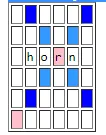
Gameplay
Scrabble is a vocabulary game for ages 8 and up. It’s a game for 2-4 teams. It includes a specialized game board, 100-letter tiles, and tile racks. According to Scrabble rules, all tiles can be put in a letter pouch or placed face down on the table next to the board. Ensure that the letters are well-matched and that the players do not know which letter is in what position. To decide who goes first, each player draws a letter – the player with the letter nearest to the letter “A” goes first. The ‘blank’ tile would immediately go first. Make sure you remix the tiles thoroughly before drawing letters. Each player draws seven letters and places them on his or her letter rack. According to scrabble rules, there are three main steps to a turn:
- Play a Word
- Total the Score for that Word
- Draw Tiles to Replace the Tiles Played
The first player must play his first word on the middle square of the game, the position that has a ‘star’ on it. Both words have to be two or more letters long. Words are played vertically or horizontally. Diagonal wordplay is not allowed. The play still moves clockwise (to the left). Each player is to play off the terms that are already on the board. This may include modifying current words (for example, converting the word ‘play’ into ‘player’) or adding a letter to the word you’re playing. You may only put letters in a straight line horizontally or vertically. On a single turn, you can put letters in both directions. The letters that have been put must shape full words. Whenever two or more letters come in contact, they must be true, legal terms. For example, if you add ‘s’ to an existing word and make it a plural word and then create a different word from ‘s’ in the other way, you’d get full credit for both terms. No tile can be moved or moved as soon as it is played (bearing a successful challenge).
Whenever a word is played, other players can question the word if they don’t think it’s a real word or if it’s pronounced wrong. Under Scrabble rules, players can settle on the dictionary they can use before the game starts. Both words in the dictionary that are classified as sections of speech, like foreign roots, outdated, and slang, are allowed. The only words in the dictionary that are not legal are as follows: abbreviations, prefixes, and suffixes remaining alone, words requiring a hyphen or apostrophe, and words requiring capitalization. If you want to dispute the opponent’s word, you have to challenge it before you pass to the next team. If the word in question is not valid, such tiles will revert to the player’s hand and the player will forfeit the game. If a word is contested and it is legal, the opponent will lose his or her next turn. If several words are used in a turn, all words will be questioned when one word is challenged. If all of the terms are not legal, all the tiles will be returned to the owner’s hand and the player will forfeit his or her turn. The dictionary can only be used if a word is genuinely questioned and can never be used until a word is used for clarification purposes.
Scorekeeping
The score for each turn is the sum of the letter values for each word(s) created or changed on that turn, plus the additional points earned by putting letters on Premium Squares.
Premium Letter Squares: a light blue square doubles the score of a letter put on it; a dark blue square triples the score of a letter.
Premium Word Squares: The score for a whole word is multiplied when one of its letters is placed on a pink square: and tripled when one of its letters is placed on a red square. Have premiums for double or triple letter values, if any, until the term score is doubled or tripled. When a word is created that occupies two premium word squares, the score is doubled and then doubled (4 times the number of letters) or tripled and then tripled again (9 times the letter count). Letter and word premiums only count on the turn on which they are played. On later flips, the letters still played on the premium square count at face value.
If a blank tile is played on a pink or red rectangle, the value of the term is multiplied or tripled, even if the blank itself does not have a score value.
When two or more words are written in the same match, each is scored. The common letter (with maximum premium value, if any) is counted for each term. If you play seven tiles at a turn, it’s called a bingo. You score an extra 50 points after you have totaled your turn score otherwise.
Unplayed Letters: After the game ends, the score of each player is diminished by the sum of his or her unplayed letters. In addition, if the player has used all of his or her letters, the total of the unplayed letters of the other players will be added to the score of the player.
The game is won by the player with the highest final score. In the event of a draw, the player with the highest score wins before adding or deducting unplayed letters.
If the game has one winner and one loser, the player who scored more points (combined in both games) wins the game. If the number of the two teams is the same, the match is a draw.
Examples of scoring
Consider the following series of moves, beginning with an empty board, as an example (only showing the middle section of the board).
For this first step, add the point values of the letters, 4+1+1+1=7, and then double that, since the letter r is on a double-word ranking (remember, the first play must always be there).

The second term, farm, shares the r of the first word, but the double word cell is known to be “used up” because the r was not played this turn. The score is then just the point values of the letters, rounded up: 4+1+1+3 = 9.

Paste lands on two triple-letter ratings, so that the values of p and e are tripled: (3+3+3)+1+1+1+(1+1+1)=15, but the word farm is a new word so that the maximum meaning of the word is inserted in 4+1+1+3+1=10, for a total of 25.

In this case, the double letter counts twice, as it is used concurrently in two separate words, not (1+(1+1)+1=4) and not (3+(1+1)+3=8). Counting be (3+1=4) is a total of 16 for this move.

This play makes three words bit (3+1+1=5), which is doubled, and pi (3+1=4) and (1+1=2) for a total of 16.

Tournament players use glossy tiles
The tile you buy from your nearby store is likely to have etched letters that are not legal in tournament play. Tournament-legal tiles have letters that cannot be detected by touch, and players must keep the bag above eye level while drawing tiles.
Keep your rack balanced
Richard Silberg, who has been playing in Scrabble tournaments for decades, gives this example: “If you have ‘ACKRSTU,’ you might play ‘road,’ ‘truck,’ or ‘struck.’” His suggestion is to play ‘truck,’ as ‘A’ is much more attractive than ‘U,’ and holding ‘S’ is generally worth giving up a few points.”
Some foreign words are accepted
International words are allowed as long as they appear in English dictionaries. However, proper nouns, abbreviations, stand-alone prefixes and suffixes, and words involving a hyphen or apostrophe are not recognized.
Competitive Scrabble is timed
In this game, any player is only given 25 minutes to make all their moves—and chess clocks are used to keep time. Each side usually makes 11 to 13 moves in a tournament game, which is equivalent to around two minutes per game. Exceed your allotted time and you will be penalized by 10 points for any minute above 25.
Passing your turn
If you don’t want to move or change your tiles, you can still take your turn. You get zero points to move, and the next player takes a turn. However, according to Scrabble rules, the game stops if there are six straight zero scores, so make sure everyone plays on the board before the sixth move!
Once all the tiles have been removed from the bag and a single player has put all their tiles, the game will end and the player with the highest score wins.



